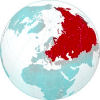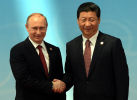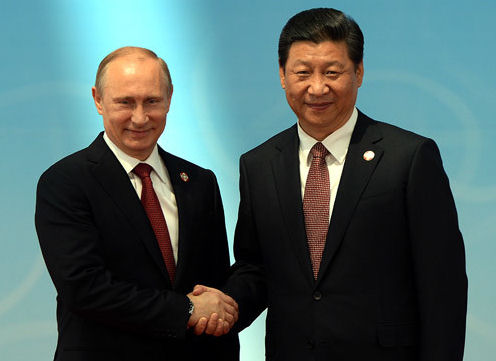Battle of the Titans - by Mark Jones: Russia, US, Europe, China

 Mark Jones wrote “Battle of the Titans” when he was dying of cancer in 2005. This project animated his last days and he believed that what he had to say was of utmost importance. Many readers will find it prophetic, except in so far as he overlooks the role of Russia as an oil supplier. He does not overlook China, however, and America’s willingness to use all its remaining fuel to retain global hegemony. Here I have extracted passages which fit quite well together and give a somewhat clairvoyant view – from 2005 – of today’s frantic posturing, propagandizing and stirring up trouble in Ukraine, by the United States and Europe as they perhaps tried to influence China to side with them through their power-play in the Ukraine, then, helplessly watched Putin sign the massive gas supply contract with China.
Mark Jones wrote “Battle of the Titans” when he was dying of cancer in 2005. This project animated his last days and he believed that what he had to say was of utmost importance. Many readers will find it prophetic, except in so far as he overlooks the role of Russia as an oil supplier. He does not overlook China, however, and America’s willingness to use all its remaining fuel to retain global hegemony. Here I have extracted passages which fit quite well together and give a somewhat clairvoyant view – from 2005 – of today’s frantic posturing, propagandizing and stirring up trouble in Ukraine, by the United States and Europe as they perhaps tried to influence China to side with them through their power-play in the Ukraine, then, helplessly watched Putin sign the massive gas supply contract with China.Mark Jones was an author and novelist with a long-time interest in the political economy of oil. He lived and worked in the Soviet Union and in post-Soviet Russia, working for a time with the New Statesman, whilst researching archives newly opened under Gorbachev’s policy of Glasnost. He founded the Conference of Socialist Economists and their journal, Capital and Class, in the mid 1970s and in the 1980s he was remanded in custody for publishing Leon Trotsky’s writings. He sustained a deep interest and sympathy for communism, and was concerned by the limits to growth and believed that the US economy had an unsustainable but unstoppable need for oil. His novel Black Lightning, about the fall of the Soviet Union, was published in 1995 by Victor Gollancz. The original article of which excerpts are published here was published in the first and second editions of The Final Energy Crisis Pluto Press, UK, 2006, 2008. (First edition edited by Andrew McKillop and Sheila Newman; second edition by Sheila Newman, sole editor.)

Excerpts from Battle of the Titans, by Mark Jones
Headings by candobetter.net editor
The middle decades of the last century might best be seen as an interregnum, during which time the declining and ascendant imperialist powers, Britain and the US, colluded and collaborated to fight rivals (Japan, Germany) and marginalize or contain rivals (Bolshevism). Once US hegemony was assured (by 1945) it was relatively straightforward to restructure the global system on a new, US-dominated basis, and to create the institutions and frameworks for global commerce and international law that secured unchallenged US hegemony. Except for two brief periods during the Korean and Vietnam wars, the USSR ceased to be a serious challenge after 1945, despite the much-vaunted menaces of the Cold War period.
[…]
Comparing British and US empires
In its heyday the British Empire was more powerful and effective than the US empire has been or is today. The British not only moved populations around in huge numbers; they also moved plant and animal species. The British did more to shift and transplant alien flora and fauna from one continent to another, thus reconstructing whole ecosystems, than any other empire, although the Romans did a lot more in that sphere than most people realize. It takes a lot of arrogance and certainty to do the kinds of things the British ever-so-freely took it upon themselves to do. They reshaped whole continents, from Australasia through Africa to Latin America. Successive waves of emigration from the homeland created a whole English-speaking world, of which the US was at first only a subset and which it finally inherited, but had not created. The British ploughed their way through every precapitalist social formation they encountered, and either wiped it out or, through colonialism, totally reconstructed it. Yet despite (or because of) these grandiose achievements the British Empire, which seemed so enduring, was a short-lived thing. There is nothing to suggest that the seeming permanence of the US imperium should be any less fleeting. There is also no reason to suppose that sheer self-interest might not drive Americans themselves into a recognition that the price of domination, alone and unchallenged, is too high, and that an accommodation must therefore eventually be made with a rival who might one day become a successor. Since the 1939–45 war, the US has in fact made a practice of co-opting present and potential rivals into junior partnership. It has done this not only to Britain, but also to Germany (1960s), Japan (1970s and 1980s) and latterly even to Russia (from 1991).
The US is now functionally locked into Chinese industrial capitalism; the two states are in a tight embrace, performing a minuet which is part dance of death and part marriage of convenience.
US and China economic enmeshment
Both states face many common problems, and each needs the other because of complementarities and useful asymmetries. However, the radical contradictions between them ensure that they are imperial rivals. And the balance of power between them appears to be changing. US economic and therefore military growth significantly declined from the later 1980s through to 2002. China has been growing faster, and has now entered a decisive phase of industrialization, where its industry is so diverse, deep, broadly based and synergistic that it appears to be crossing a threshold, and is emerging as the world’s premier industrial power, eclipsing all others, with an R&D capability equivalent to that of the US or Japan. Many estimates indicate that Chinese industrial production will outstrip that of the US during the present decade. It seems clear that Asia as a whole is now poised on the cusp of precipitous changes, and that the US is now clearly the declining regional power, giving way to rising regional hegemony for China. It is surely arguable, or even likely, that China could become the dominant power in Asia without the need for war, and with the US being unable to prevent this. Once the economic facts are in place, can the geopolitical consequences be far behind? What can prevent the binding together and fusion of Chinese, Japanese and Taiwanese industry and capital, under Chinese hegemonic control?
Thus for the first time in its history, the US now faces the distinct possibility of the partial eclipse of its global power. I cannot predict what will happen, and I doubt whether anybody can know, but it is surely plausible that the US will be obliged to accept its strategic defeat with good grace, to accept a seismic change in its status and position, because the US is simply no longer powerful enough to resist. The rise of China to at least regional Asian ascendancy seems to be already in the script, an inevitable and unalterable outcome of present trends.
[…]
Extra-human limits
There is, however, one huge caveat to this whole line of argument. It does not take account of underlying, apolitical, extra-human and planetary limits, which will most certainly afflict the world system, and which mean we are entering a still more radical and decisive epoch of historical challenge, upheaval and transformation in everything from geopolitics to everyday life. As is indicated by the very title of this book, no geopolitical analysis can ignore the colossal threats posed by the storm of self-reinforcing crises – anthropogenic climate change, mass extinction of species, and destruction of the biosphere – all of which were enabled by fossil energy supplies, whose wipeout will be rapid. These factors form a vast backdrop to all world-system or economics-based considerations of inter-imperial rivalry à la Lenin. But before attempting to integrate this domain of issues into the discussion, let us consider again this central question: What if China emerges first from the probable imminent global economic slump?
This slump, if it occurs, will hit the US and Europe especially hard. The dollar will decline, industrial output will shrink, consumption levels and living standards will drop with incomes. The US economy will be first and hardest hit, notably because it is wildly unbalanced, extremely dependent on cheap energy, and equally dependent on the dollar’s “reserve currency” hegemony, which enables its payments deficit to be ignored. Any US economic slump will inevitably bring with it a collapse in personal and public consumption levels. Obviously this collapse in US demand will hit major exporters, China above all. China will then have to find other outlets for its huge industrial output. This means exporting to other regions which may be doing little better than the US, such as Europe and Japan, India, Southeast Asia, Russia, and the Latin American countries – but perhaps firstly, countries which export oil, minerals, metals, and agrocommodities, which profit from higher prices for these items.
[…]
Naked emperor out in the cold
Once you strip out dollar hegemony and the advantages of being the global reserve currency (or “currency of last resort”), you are left with a very naked emperor. Except for weaponry, control of the skies and sea lanes, control and surveillance of world information networks, and a powerful propaganda machine, the US has few cards left. Take away dollar hegemony and you have just another regional economy with its fair share of internal problems (soil exhaustion, aquifer depletion, near-exhaustion of domestic oil and gas reserves, lack of alternative energy supplies, a polluted environment, poor infrastructures, badly designed and expensive-to-maintain urban environments). If the US has to compete on a level playing field with the rest of the world, then it may find that its urban infrastructure is just as uneconomic and unsustainable as was the Soviet Union’s loss-making effort to base itself on the industrialization of the Urals and Siberia. The US currently uses twice as much energy and raw materials per capita as the EU-15 average, and more than ten times that of China. It is desperately uncompetitive. When the dollar has to be backed up by real values, US per capita GNP may fall by half in just a few years, as in the Great Depression. Under these conditions it is hard to see how the US can hope to maintain its global reach and present hegemonic position.
Time running out
[…]
If, on the other hand, we are set on a course of global war, which was the outcome for “classic” economic depressions before 1914, and again through 1929–36, then Americans have only a very small window of opportunity (like Hitler enjoyed in 1939) before their military advantage evaporates.
Comment by editor
Mark Jones wrote the above conclusion - the last three lines - in 2005. By his calculations, the United States would have used up most of the surplus energy that gave it any military advantage.

Recent comments